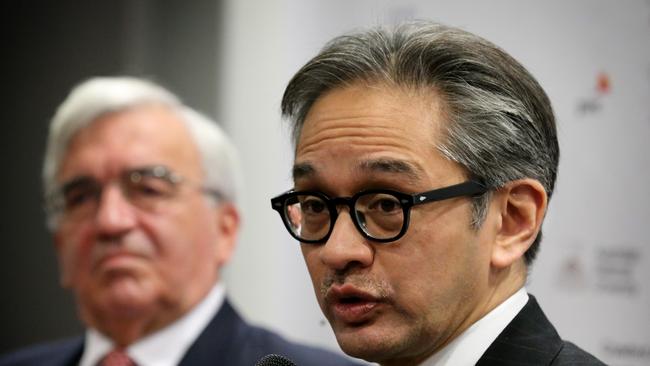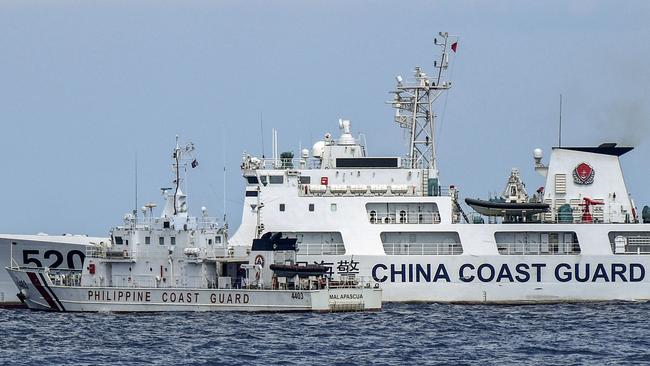ASEAN neutrality a ‘path to nowhere’: ex-Indonesian FM
Marty Natalegawa says Southeast Asian nations cannot stand on the sidelines and expect to remain relevant.

Southeast Asian nations cannot stand on the sidelines amid escalating great-power rivalry in their region and expect to remain relevant, Indonesia’s former foreign minister, Marty Natalegawa, has warned on the eve of the Jakarta-hosted ASEAN leaders summit.
Dr Natalegawa, one of the region’s most respected foreign policy experts, said the Association of Southeast Asian Nations was being circumvented by more agile mini-lateral groupings such as AUKUS, the Quad and BRICS, and must play a more active role in deterring open conflict between rival powers.
“I am of the view that if we simply say we don’t want to choose, that we are neutral, that is a guarantee of ASEAN irrelevance, and we are seeing that already,” he told an ASEAN business forum in Jakarta on Sunday. “We are seeing the initiation of processes that circumvent ASEAN. There is a risk, in my view, not only on the one hand of a sense of complacency and self-celebration but at the same time a sense that we are becoming increasingly inward.”
The warning comes ahead of three days of leaders meetings culminating in the East Asia Summit, which both US President Joe Biden and China’s Xi Jinping have opted not to attend.
Anthony Albanese will join the summit from Wednesday, along with the prime ministers of India, Japan, China and Canada, US Vice-President Kamala Harris and South Korean President Yoon Suk-yeol.
Nine out of 10 ASEAN leaders (excluding Myanmar) will also attend, including newly installed Cambodian Prime Minister Hun Manet and Thailand’s Srettha Thavisin, elected Prime Minister in a controversial parliamentary vote late last month.
The regional bloc has weathered a flurry of criticism for its failure to speak out over China’s maritime bullying of The Philippines, or to make inroads in resolving the crisis in Myanmar.

Indonesia, as current ASEAN chair, is under intense pressure to raise concerns this week over a new Chinese map reasserting Beijing’s disputed claims to the South China Sea that has drawn progressive protests from Malaysia, The Philippines, Vietnam and Jakarta.
Philippines security analyst Richard Heydarian accused ASEAN on Sunday of being “missing in action when it comes to the South China Sea”, a “primordial” issue that was pushing Manila closer to Washington.
“I don’t think President (Ferdinand) Marcos Jr wants to be fully aligned with the US against China, just like much of ASEAN wants to keep things on an even keel with China,” Dr Heydarian told the ASEAN forum. “But … not making a choice is the choice in itself and it’s increasingly a luxury more and more of us cannot afford.”
In a much-discussed opinion piece published in Nikkei Asia last week, Southeast Asia analyst and author Michael Vatikiotis warned ASEAN was at a “dangerous crossroads” because of an inability to address internal political conflicts, or the escalating geopolitical struggle between China and the US playing out in its region. Deepening schisms within ASEAN’s 10 member states – soon to be 11 with the inclusion of East Timor – over the relative threat posed by China, and how to deal with the destabilising Myanmar regime, had made Southeast Asia “more fragile and isolated than it appears”, he argued.
“Great-power leaders who once routinely attended regional summits now often skip them. ASEAN has lost its much-touted centrality and is, frankly, on life support as an autonomous multilateral platform.”
Dr Natalegawa said while ASEAN obituaries had been written “many times over in past decades”, the bloc was at an important juncture as it faced “geopolitical push and pull” not only from the US-China rivalry but also as a result of ongoing friction between India and China, and the newly created US, South Korea and Japan trilateral accord.
One way ASEAN leaders could earn and assert their centrality was through promoting so-called “strategic stability” in which – notwithstanding the push and pull – ASEAN can say this does not need to lead to open conflict”, he suggested.
“There is an alternative script; the notion of promoting a crisis response capacity, the notion of developing trust. These are the things I feel ASEAN can try to positively impact beyond our region. When we speak of the Indo-Pacific, the Code of Conduct for the South China Sea … I’m seeing a little bit of wait-and-see.
“We are in the driver’s seat but we are not driving anywhere.”
EDITORIAL P12



To join the conversation, please log in. Don't have an account? Register
Join the conversation, you are commenting as Logout